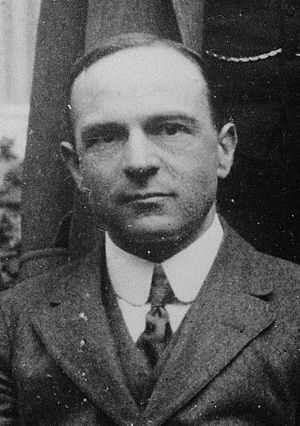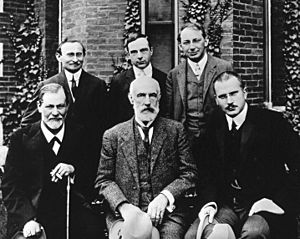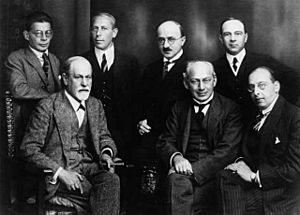Ernest Jones facts for kids
Quick facts for kids
Ernest Jones
FRCP MRCS
|
|
|---|---|
 |
|
| Born | 1 January 1879 Gowerton, Wales
|
| Died | 11 February 1958 (aged 79) London, England
|
| Nationality | Welsh |
| Alma mater | University College London |
| Spouse(s) |
|
| Scientific career | |
| Fields | |
Alfred Ernest Jones (born January 1, 1879 – died February 11, 1958) was a doctor from Wales. He was a neurologist, who studies the brain, and a psychoanalyst, who helps people understand their thoughts and feelings.
He was a close friend and colleague of Sigmund Freud, a very famous thinker. Ernest Jones later wrote Freud's official life story. He was the first person to practice psychoanalysis in English. He became a top leader in this field for English-speaking countries. As a leader of important groups like the International Psychoanalytical Association, Jones helped shape how psychoanalysis was taught and shared.
Contents
Ernest Jones's Early Life and Studies
Ernest Jones was born in Gowerton, a village in Wales, on January 1, 1879. His father, Thomas Jones, was a self-taught engineer who became a successful businessman. His mother, Mary Ann, came from a Welsh-speaking family.
Jones went to school at Bishop Gore School and Llandovery College. He then studied at Cardiff University in Wales. Later, he attended University College London. In 1900, he earned his first medical diplomas. By 1901, he received a degree in medicine and obstetrics with honors. He earned his MD degree in 1903.
Becoming a Brain Doctor
After finishing his medical studies, Jones decided to focus on neurology. This is the study of the brain and nervous system. He worked in several hospitals in London.
He learned about Sigmund Freud's work through his friend, surgeon Wilfred Trotter. They were both interested in new ideas about the mind. Jones was upset by how people with mental illness were treated. He started trying out hypnosis to help his patients.
In 1905, Jones read about Freud's ideas for the first time. He was very impressed that Freud truly listened to his patients. This was a new and different way for doctors to work.
Ernest Jones's Family Life
Ernest Jones had his first serious relationship with Loe Kann in 1906. This relationship lasted until 1913.
In 1917, Jones married a Welsh musician named Morfydd Llwyn Owen. Sadly, Morfydd became very ill with appendicitis in 1918 while they were on holiday. She had emergency surgery, but she passed away. Jones arranged for her to be buried in Wales.
In 1919, Jones met and married Katharina Jokl. She was an economics student from a region called Moravia. Katharina had even gone to school with Freud's daughters. They had four children together and a long, happy marriage. They faced a sad time when their oldest child, Gwenith, died at age 7 from the flu. Their son, Mervyn Jones, later became a writer.
Ernest Jones's Psychoanalytic Career
In 1907, Ernest Jones met Carl Jung at a meeting in Amsterdam. Jung told him about Freud's work in Vienna. Jones realized how important Freud's ideas were. He joined Jung in Zürich to plan the first Psychoanalytical Congress.
This meeting happened in 1908 in Salzburg, where Jones met Freud for the first time. Jones then visited Vienna to talk more with Freud. This was the start of a very important friendship and working relationship. It lasted until Freud's death in 1939.

Working in Canada and the USA
Because his career in Britain was difficult, Jones moved to Canada in 1908. He taught at the University of Toronto in the Psychiatry Department. He also started his own private psychoanalytic practice.
In 1909, Jones met Freud again at Clark University in the USA. Freud gave talks on psychoanalysis there. Jones then worked to build strong connections with the new psychoanalytic movement in America. He gave many talks to professional groups. In 1910, he helped start the American Psychopathological Association. The next year, he co-founded the American Psychoanalytic Association.
Jones wrote many important papers and books about psychoanalysis. These writings helped him become a key member of Freud's close group. In 1912, Jones helped create a special "Committee" to protect Freud's ideas. This group also helped remove Jung from his leadership role in the International Psychoanalytical Association.
Leading Psychoanalysis in Britain
Jones returned to London in 1913. He started his own psychoanalytic practice. He also founded the London Psychoanalytic Society. He continued to write and give lectures. His book, Papers on Psycho-Analysis, was the first English book about psychoanalytic theory written by a practicing analyst.
In 1919, Jones founded the British Psychoanalytical Society. He proudly told Freud that psychoanalysis was becoming very important in Britain. Jones was the President of this society until 1944. He helped get money to open a clinic in London that offered affordable therapy. He also set up an Institute of Psychoanalysis. This institute helped manage, publish, and train new psychoanalysts.

Jones was also President of the International Psychoanalytic Association for two periods. He had a big impact on the field. In 1920, he started the International Journal of Psychoanalysis and edited it until 1939. The next year, he created the International Psychoanalytic Library, which published many books.
Jones also got the rights to translate Freud's works into English. He worked with Joan Riviere to edit the first translated volumes of Freud's Collected Papers. Later, he helped plan the full "standard edition" of Freud's works.
Thanks to Jones's hard work, the British Medical Association officially recognized psychoanalysis in 1929. In the 1930s, Jones and his colleagues even gave radio talks about psychoanalysis.
After Adolf Hitler came to power in Germany, Jones helped many Jewish psychoanalysts who were in danger. He helped them move to England and other countries. In 1938, Jones bravely flew to Vienna to help Freud and his family move to London.
Discussions and Differences
Jones's early writings explained Freud's main ideas. But then, he became interested in the ideas of Melanie Klein. Klein was a child psychoanalyst who had new ways of working with children.
Klein moved to London in 1926 at Jones's invitation. Her ideas caused some disagreements within the British Society. Her approach to child analysis was different from that of Anna Freud, Sigmund Freud's daughter. The main argument was about how to treat young children. Klein believed that playing was like talking freely for adults. Anna Freud thought children needed to develop more before deep analysis.
These disagreements caused some tension between Freud and Jones. But they eventually worked things out. When more German and Viennese analysts came to Britain in the 1930s, the arguments between Freud's followers and Klein's followers grew stronger.
Jones led many meetings to try and solve these conflicts. These meetings became known as the "controversial discussions." In 1944, Jones stepped down as president of the British Society. A compromise was reached that allowed different groups of analysts to train and work together.
Later Life and Legacy
After World War II, Jones slowly gave up his official roles. But he continued to practice psychoanalysis, write, and give lectures. His biggest project in his later years was writing a huge three-volume book about Freud's life and work. This book was published between 1953 and 1957 and was highly praised. His wife, Katharina, helped him a lot by translating Freud's early letters. His own life story, Free Associations, was published after he died in 1959.
Jones was always proud of being Welsh. He joined the Welsh Nationalist Party, Plaid Cymru. He especially loved the Gower Peninsula in Wales, where he spent many holidays. He helped make it the first area in the UK to be named an Area of Outstanding Natural Beauty in 1956.
Jones also wrote books about his hobbies. He was a keen ice skater and published an important textbook on the subject. His love for chess led him to write a psychoanalytic study of the American chess player, Paul Morphy.
Ernest Jones received many honors. He became a Fellow of the Royal College of Physicians in 1942. He was made Honorary President of the International Psychoanalytical Association in 1949. In 1954, he received an honorary science degree from Swansea University.
Ernest Jones passed away in London on February 11, 1958. His ashes were buried in the grave of his oldest child in Wales.
Works by Ernest Jones
- 1912. Papers on Psycho-Analysis. This book was updated many times.
- 1920. Treatment of the Neuroses.
- 1921. Psycho-Analysis and the War Neuroses. Written with other experts.
- 1923. Essays in Applied Psycho-Analysis.
- 1924 (editor). Social Aspects of Psycho-Analysis.
- 1928. Psycho-Analysis. Later called What is Psychoanalysis?.
- 1931a. On the Nightmare.
- 1931b. The Elements of Figure Skating. A book about ice skating.
- 1949. Hamlet and Oedipus.
- 1953. Sigmund Freud: Life and Work. Vol 1: The Young Freud 1856–1900.
- 1955. Sigmund Freud: Life and Work. Vol 2: The Years of Maturity 1901–1919.
- 1957. Sigmund Freud: Life and Work. Vol 3: The Last Phase 1919–1939.
- 1956. Sigmund Freud: Four Centenary Addresses.
- 1959. Free Associations: Memories of a Psycho-Analyst. His autobiography.
Important Letters
- Paskauskas, R Andrew (ed), The Complete Correspondence of Sigmund Freud and Ernest Jones, 1908–1939., Belknap Press, Harvard University Press, 1995, ISBN: 978-0-674-15424-7
- Sándor Ferenczi – Ernest Jones: Letters 1911–1933. London: Karnac Books, 2013. ISBN: 978-1-7804917-6-9
Images for kids
-
Group photo 1909 in front of Clark University. From left to right, seated: Sigmund Freud, G. Stanley Hall, Carl Jung; standing: Abraham A. Brill, Ernest Jones, Sándor Ferenczi.
-
The "Committee" in 1922. From left to right, seated: Sigmund Freud, Sándor Ferenczi, and Hanns Sachs. Standing: Otto Rank, Karl Abraham, Max Eitingon, and Ernest Jones.
See also
 In Spanish: Ernest Jones para niños
In Spanish: Ernest Jones para niños
- The Life and Work of Sigmund Freud
 | Anna J. Cooper |
 | Mary McLeod Bethune |
 | Lillie Mae Bradford |



